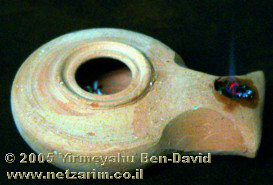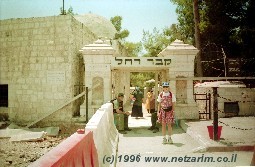
 |
| Torâh | Haphtârâh | Âmar Ribi Yᵊhoshua | Mᵊnorat ha-Maor |
|---|---|---|---|
 |
For many years now, polls of the Jewish community, including polls by highly respected Jewish organizations, demonstrate conclusively the impending extinction of Tor•
The unavoidably essential elements of this revolutionary revival are outlined in my soon-to-be-released [update: now available – PishᵊtâhꞋ KheihâhꞋ Live-LinkT ![]() ]
]
 |
| ôÌÄùÑúÌÈä ëÌÅäÈä Live-LinkT |
The following section, Angels, Miracles & Wonders, is excerpted from my book (in English), ôÌÄùÑúÌÈä ëÌÅäÈä Live-LinkT ![]()
- Miracle
- An event that appears inexplicable by the laws of nature and so is held to be supernatural in origin or an act of
god" (The American Heritage® Dictionary of the English Language, Fourth Edition, Copyright © 2000 by Houghton Mifflin Company).- Supernatural
- (1) Of or relating to existence outside the natural world. (2) Attributed to a power that seems to violate or go beyond natural forces. (3) Of or relating to a deity. (4) Of or relating to the immediate exercise of divine power; miraculous. (5) Of or relating to the miraculous."
- Wonder
- Something that causes astonishment or admiration.
The operative word in the definition of the English word, miracle, above, is "appears." In English, miracles present a dilemma. Is man arrogant to assume that whenever he or she doesn't understand the physics involved, then a phenomenon has to violate the laws of physics (i.e., be supernatural) to occur? Or, alternately, does the Perfect (?) Creator of the universe contradict His Perfect (?) laws to accomplish His Perfect (?) objectives? Self-contradiction demonstrates imperfection.
ðÅñ ÷ÈôÆä
(Where have you heard that?)In the original Hebrew, the term that is translated into English as miracle is ðÅñ, an astonishing sign that is peculiarly fortunate or appropriate and beyond contemporary explanation—as if by divine intervention. In Hebrew, there is no contradiction between ðÅñ and the natural laws of the universe. A ðÅñ is simply a phenomenon that exceeds contemporary scientific knowledge. If a Biblical person saw a modern cell phone, television, airplane, missile or satellite they would certainly call it a ðÅñ. In modern Israel, the popular term for instant coffee is simply—ðÅñ!
For the Perfect Creator to have to intervene in His perfect creation and contradict His perfect natural Order (laws) with supernatural corrections in order to achieve His perfect objectives implies self-contradiction and original incorrectness—i.e. imperfection. Alternately, for a Creator to design natural laws that will achieve all of His objectives without intervention implies a level of knowledge far exceeding the natural universe (including time, which is limited to our universe), which both eliminates contradictory supernatural interventions and agrees entirely with the teachings of Tor•
âhꞋ .The Hebrew word sometimes translated as "angel" (other times inconsistently translated as "messenger") is îÇìÀàÈêÀ. Often, however, îÇìÀàÈêÀ explicitly refers to a human being. This continues to elude rabbinic understanding. In ancient times, a holdover from Egyptian Pharaonic assertions of divinity, tribal leaders and judges were held to be àÁìÉäÄéí (ël•oh•im′;
gods; see bᵊ-Reish•it′ 3.5; 6.2, 4; Shᵊm•ot′ 7.1; 21.6, 13; 22.7-8; et al.). Belief in "angels" and their evil counterpart, demons, are extensions of the superstitious belief in the supernatural.
Lu•lâvꞋ & Ët•rogꞋ This is particularly conspicuous in two passages in which the rabbis have chosen, for simplistic convenience, to understand "angel" rather than a representative of é--ä: the explicitly stipulated men of bᵊ-Reish•it′ 18 and the stipulated man with whom Ya•a•qov′ wrestled—his brother Ei•sau′ who, like Ya•a•qov′, was a tribal chief. Rabbinic superstition in the latter case led to blasphemy (see the section in ôÌÄùÑúÌÈä ëÌÅäÈä Live-LinkT
on Lu•
lâvꞋ & Εt•rogꞋ , Waving On Shab•âtꞋ ). By creating intractable contradictions, rabbinic superstition in the first case has rendered Tor•âhꞋ —as rabbis interpret it—impossible to defend against Christian polemics.
Perhaps a bit spooky
(Jim Carry, The Cable Guy movie)It is impossible to dispute that Scripture does explicitly stipulate that these visitors ARE é--ä, NOT a ma•lâkh′ of é--ä as the rabbis wish it read. They were é--ä in the same sense that you might announce the cable guy at your front door: "Honey, the cable company is here." Would you mean a spooky, winged "angel" of the cable company??? Av•râ•hâm′'s visitors were human representatives of é--ä, not a divine manifestation of é--ä that presaged the Christian man-
god, which rabbis ignorantly and futilely try to pass off as "angels."
Rationalists from Mosh′ëh to Ramba"m′ agree: while belief in Ma•lâkh•im′ is an essential element of Tor•![]() ), is irrational idolatry prohibited by Tor•
), is irrational idolatry prohibited by Tor•
 |
48.16 – äÇîÇìÀàÈêÀ äÇâÌÉàÅì àÉúÄé
 |
The Sages all concur with the context: Yi•sᵊr•â•eil′ addresses his tᵊphil•âh′ not to the îÇìÀàÈêÀ in pâ•suq′ 16 but to ha-eloh•im′ in pâ•suq′ 15. But what îÇìÀàÈêÀ—as contrasted with ha-eloh•im′—go•eil′ him? Except in the imaginary pretend world of the irrational, this ma•lâkh′ can only be Yo•seiph′ (see ëÌÄé ìÀîÄçÀéÈä —45.5). Moreover, Yi•sᵊr•â•eil′ was instructing, and relying upon, Yo•seiph′ as a îÇìÀàÈêÀ é--ä, in praying to ha-eloh•im′ that Yo•seiph′ would carry out the Will of é--ä concerning how the two boys should be blessed and how their names should be associated with the Patriarchs.
None of the Sages or commentators have perceived the great legacy of àÆôÀøÇéÄí envisioned by Yi•sᵊr•â•eil′ in 48.19: åÀæÇøÀòåÉ éÄäÀéÆä îÀìÉà-äÇâÌåÉéÄí
 250x188.jpg) |
Yet, the closest that the descendants of àÆôÀøÇéÄí seem to come to fulfilling the prophecy of Yi•sᵊr•â•eil′ is in the person of Yᵊho•shu′a Bën-Nun and, as valiant and great as his accomplishments were (e.g., winning the battle "åÇéÌÄãÌÉí äÇùÑÌÆîÆùÑ åÀéÈøÅç òÈîÈã"—the summer solstice, Yᵊho•shu′a Bën-Nun 10.12-14), he didn't come close to any "filling the goy•im′."
Non-Jewish commentators, unable to even read úð"ê, have asserted that the name àÆôÀøÇéÄí implies àÆôÀøÈúÈä in Mikh•âh′ 5.1, attempting to read messianic salvation to àÆôÀøÇéÄí ⇒ àÆôÀøÈúÈä (via Mikh•âh′'s prophecy) ⇒ goy•im′, thereby retrojecting the Christian perversion into the mouth of Yi•sᵊr•â•eil′ to corroborate Christian belief in christological salvation to goy•im′. This is a good illustration of the dangers of the unscholarly, unscientific and illogical approach of first deciding what Scripture has to mean (to be compatible with a predisposed belief) and then finding some way to interpret it in support of that meaning. This is particularly pervasive among Christians who, with rare exceptions, cannot even read the first word of Scripture.
 |
| Arab-occupied Beit |
Scripture informs us (Di•vᵊr
The English adverbial suffix "-ward" (e.g., eastward) has a parallel in Hebrew—ä□ (□âh). In this case, to express "àÆôÀøÈú-ward", "toward àÆôÀøÈú", is àÆôÀøÈúÈä. There is no implication of àÆôÀøÇéÄí and messianic assertions dependent upon this line of reasoning fail on the collapse of this premise—ex falso quodlibet.
 |
Collapse of one line of reasoning, however, doesn't imply that there is not some other valid argument supporting a messianic intent (though not the 4th century CE Hellenist syncretism that Christianity attempts to inject) in Yi•sᵊr•â•eil′'s prophecy. Recall that àÆôÀøÇéÄí was the son of Yo•seiph′—in Hebrew, Bën-Yo•seiph′, as in Mâ•
The Mâ•
This also accords with the usage by the nᵊviy•im′ of àÆôÀøÇéÄí to refer to Yi•sᵊr•â•eil′ (the Ten Northern Tribes) because their first king, Yaravam, was from the tribe of àÆôÀøÇéÄí. Later, àÆôÀøÇéÄí (the Ten Northern Tribes of Yi•sᵊr•â•eil′) was later exiled (B.C.E. 721) among, and assimilated into, the goy•im′. This paradigm unambiguously suggests that the Mâ•
 |
The Mâ•
Thus, bᵊ-Reish•it′ 50.19-20 provides a great insight into the operation of the Mâ•shi′akh prophesied in Tor•
äúçú is used here similar to Shᵊm•ot′ 21.24, where the literal translation is "eye under eye'"
Thus, the paradigm of the Mâ•shi′akh teaches that, like Yo•seiph′, the Mâ•shi′akh wouldn't displace é--ä. (Such displacement is a Hellenist Roman—idolatrous—concept intractably contradictory to the first
 Yoseiph vizier Kheper ka Re Sen-Wosret (Sesostris) I Cairo Museum 250x267.jpg) |
This clarification to his family by Yo•seiph′ is despite Yo•seiph′ being regarded as an Ël•oh•im′ by the Egyptians (just as the Egyptians regarded their pharaohs to be Ël•oh•im′ and, today, Christians regard Yësh"u to be Ël•oh•im′)! "When Joseph described himself as 'father to Pharaoh' (45:8) he was citing a known Egyptian title 'Ël•oh•im′'s [i.e., the king's] Father.'" (Ency. Jud. 10.205). Egyptians regarded Pharaoh as an Ël•oh•im′. To be father to Pharaoh was to be father of a Ël•oh•im′, i.e., a son of Ël•oh•im′.
Beyond these, just as the Egyptian superpower of that era was the instrument of sustenance because of Yo•seiph′, today the American superpower is the instrument of sustenance because of the Mâ•
 |
 |
Each of us, routinely, faces adversity. Plans don't work out the way we'd like. Yet, some take it in stride, learn from it, redouble their efforts and go on to succeed while others fall by the wayside and fail. Some see the glass half-empty while others see the glass half-full. Which is it?
Tenacity, persistence and determination are certainly essential to success. On the other hand, optimism also provides a lot of momentum that helps ward off discouragement and the temptation to quit and fail. But how can one preserve his or her optimism in the face of sometimes crushing adversity?
It is hard to imagine adversity more crushing that that faced by the teenager Yo•seiph′—being shipped off to slavery in a foreign country. Yet, Yo•seiph′ came to realize that (50.20): "While you conspired bad upon me, Ël•oh•im′ conspired for good, for the purpose, as has become today, to preserve-alive a great kindred."
When our most crucial plans go awry and we face the most crushing adversity, those who are doing their utmost to keep Tor•
Developing a successful outlook requires that, even when things look most gloomy and calamitous to the outside observer, we realize that our Father has our best interest in Mind more than we can grasp or figure. This is faith in its proper perspective, and part of the prescription for success and prosperity. Yo•seiph′ succeeded and prospered. So can you.
Anyone can praise
 |
In the past couple of weeks a number of inquirers have written of their discouragement in having no one with whom they can fellowship because they're too Judaic for Christian Jews and gentiles, but aren't accepted in the
The right path is narrow, difficult and few find it, but, if you're on the right path, neither will it be lonely nor unhappy. You cannot be in the middle. The middle is limbo, unacceptable to either, the nadir of misery.
 |
As I look ahead to next week's pâ•râsh•âh′ this morning (Yom
I saw them just last night at a great gala banquet celebrating the Bar Mitzwah of one of their sons. Sitting at a table with Karen and nine other fellow members of Beit ha-K'neset Moreshet Avot, including the chairman of the Va•ad, (committee, board; of about 8 such tables reserved for members of Beit ha-K'neset Moreshet Avot), I still marvel at how these Orthodox Teimân•im′ have adopted Karen and me into their extended family, as family.
Last Shab•ât′, outside the Beit-ha-Kᵊnës′ët between Sha•khar•it′ and Mu•sâph′, Karen had come out from the women's section to check with me concerning any plans for Qi•dush′ (which includes typically about 3 hours of informal socializing) after Mu•sâph′. I had invited one of the congregants to our home for Qi•dush′. As I was about to advise her, one of the men summoned me aside to be sure that I'd been informed that we (Beit-ha-Kᵊnës′ët Morëshët Âvot—Yad Nâ•âmi) are having our periodic business meeting tomorrow after Shab•ât′. By the time we had finished talking, Mu•sâph′ was beginning and Karen had returned to the women's section.
After the short walk home from Beit-ha-Kᵊnës′ët, we discovered that we were supposed to be in two places at the same time! Karen had accepted an invitation from one of the women for us to have Qi•dush′ at her home. Of course, we don't use the telephone on Shab•ât′, so things were in some disarray and we missed connections with one engagement. But such things happen; we phoned the other the next day and we plan to get together this Shab•ât′, the next, or soon. Three weeks ago was a gala wedding banquet. Next week is another Bar Mitzwah. This is typical, not unusual at all.
 The point is that lonely we're not. We have a family here in Israel that we never had until we moved here. There's always something going on, sometimes more than one thing at a time! You don't have to be lonely if you're willing to climb out of your limbo and become acceptable to the
The point is that lonely we're not. We have a family here in Israel that we never had until we moved here. There's always something going on, sometimes more than one thing at a time! You don't have to be lonely if you're willing to climb out of your limbo and become acceptable to the
And this is where we come to this week's pâ•râsh•âh′. What is meant by becoming part of the Jewish family? This orbits the definitions of òí (am; kindred, i.e., an extended family) and âÌåÉé (goy; a people). Note first that âÌåÉé doesn't refer to a person. It's incorrect to refer to a person as "S(he)'s a goy." S(he)'s a people?
Tor•
In 48.4, Ya•a•qov′ says 'I will make you ì÷äì òîéí (li-qᵊhal am•im′; for a convocation / congregation of kindreds). As the Artscroll Bereishis [sic] notes (p. 2097), the passage to which Ya•a•qov′ alludes is 35.11 where the phrase was âÌåÉé å÷äì âåéí (joy u-qᵊhal joy•im′ (a people and a convocation / congregation of peoples).
As R' Kitov observed, the original blessing was uttered in
This leads to a corroboration of a point demonstrated in Who Are The Nᵊtzarim? Live-LinkT (WAN)![]() and The Nᵊtzârim Reconstruction of Hebrew Matitᵊyâhu (NHM, in English)
and The Nᵊtzârim Reconstruction of Hebrew Matitᵊyâhu (NHM, in English)![]() : outside of
: outside of
"Among the goy•im′," i.e., in the Gâl•
 |
| Kingdom Dangling By A Thread |
This mistranslation has been the only basis for the Christian claim that the NT was written to gentiles and the Hellenist Roman Church; the only, broken, thread from which such claim ever seemed to dangle! No other passage even remotely suggests that any part of the Bible was written "to" gentiles or the church. Neither the Tor•
Context requires that the Greek be rendered consistent to its Hebrew usage. WAN Live-LinkT Technology![]() and NHM
and NHM![]() make this point independently of this pâ•râsh•âh′. When the NT is re-read with this phrase restored to its original meaning, the entire NT reads dramatically differently—no longer having any message whatsoever to gentiles, only to Jews (and geir•im′)!!!
make this point independently of this pâ•râsh•âh′. When the NT is re-read with this phrase restored to its original meaning, the entire NT reads dramatically differently—no longer having any message whatsoever to gentiles, only to Jews (and geir•im′)!!!
 |
If you're unhappy in a state of limbo between the two worlds, understand first that there is no middle ground. The two are intractably antithetical, contradictory and mutually exclusive. One stands for selectively-observant (syncretizing idolatry, mixing the holy with the profane) Displacement Theology, the other for non-selectively-observant (separating the holy and profane) authentic and original Tor•
The syncretized idolatry of Christianity and Islam Displacement Theologies are pure poison, not "milk"—not even 2% milk—for "spiritual babes" who aren't yet ready for "meat." Cutting down to 2% idolatry won't do. Idolatry is idolatry and Tor•
 |
åàåìí àçéå ä÷èï éâãì îîðå åæøòå éäéä îìà-äâåéí
—48:19
(wᵊ-ulam, akhiv ha-qaton yigdal mi-menu, wᵊ-zaro yiheyeh melo-ha-joy•im′;
however, his little brother shall be bigger than him, and his seed shall fill the peoples)
The Sages and Commentators have wondered for ages, postulating several suggestions—none of which are logically satisfying—why Ya•a•qov′ deliberately chose to bless the younger of Yo•seiph′'s sons, contrary to the long held, and rarely excepted (and then not without strong reason) developing proto-Tor•
First, Klein's documents that àÆôÀøÈú is a secondary form of àÆôÀøÇéÄí.
 Qever Rakheil (Tomb of Rakheil), outskirts of Beit-Lëkh′ëm. Photograph 1996 by Yirmᵊyahu Bën-David. |
Thus, although Yo•seiph′ named his younger son àÆôÀøÇéÄí because äôøðé (hiphrani; [Ël•oh•im′] has made me fruitful; 41.52), immediately before giving the blessing to àÆôÀøÇéÄí, Ya•a•qov′ recalled not Yo•seiph′'s reason for giving him that name, but how àÆôÀøÇéÄí recalled (48.7) the death of his beloved Râ•kheilꞋ
The Artscroll editors ask rhetorically "What kind of blessing was this prediction that one day his descendents—the Ten Tribes—would be scattered among the nations? They too have a messianic vocation and their Messiah, the îùéç áï éåñó (Mâ•
The suggestion of two messianic roles doesn't end there. àÆôÀøÇéÄí derives from the verb ôøé (pᵊri; fruit)—and the éí (ayim) ending denotes a pair (of fruits)!!! Thus, no less a person than Ya•a•qov′ recognized that within one young man àÆôÀøÇéÄí was a pair—yet another pattern for one Mâ•shi′akh with a pair of distinct roles.
 |
| Arab-occupied Beit |
Consequently, Mikh•âh′ 5.1 has always been acknowledged as declaring that the birthplace of the Mâ•shi′akh must be Beit-Lëkh′ëm—àÆôÀøÈú!!! Nor is it any accident that Mikh•âh′ 5.1 is cited when documenting the birthplace of Ribi Yᵊho•shu′a (NHM![]() 2.5-6). No one born elsewhere can be a
2.5-6). No one born elsewhere can be a
In 48.20, áê (bᵊ-kha; in you) stipulates the singular. "Ramban explains that the phrase 'by you' was addressed to Yo•seiph′' Thus Yo•seiph′ will be the model for every father in Israel, àÆôÀøÇéÄí and Mᵊnasheh for all sons" (Bereishis [sic], 2123).
More succinctly, every father in Israel is to consider that he is "in you"—in Yo•seiph′ who, like Yi•tzᵊkhâq′ Âv•i′nu before him, was the early symbol of the Mâ•shi′akh line of descent, who would be sold into oblivion only to reemerge as king. Thus, perhaps not realizing it, every father blesses his children in the Mâ•shi′akh of Israel!!!
 |
![]()
2.3— "wᵊ-Shâ•mar′tâ the mishmërët of é--ä your Ël•oh•im′, to walk in His Ways, to shᵊmor His khuqot, His mi•tzᵊw•ot′, His mi•shᵊpât′ and His testimonies, as written in the Tor•
The point made in the Tor•
 |
The preeminent symbol of the Mâ•shi′akh was Dawid ha-Melekh. And how did Dawid ha-Melekh instruct his son and progeny—which includes the Mâ•shi′akh???
"Watchguard the watchguard of é--ä your Ël•oh•im′, to walk in His Ways, to watchguard His khuq•im′, His mi•tzᵊw•ot′ and His mi•shᵊpât•im′"—the Biblical terminology inclusive of both Tor•âh′ shë-bi•khᵊtâv′ (written Tor•![]() ).
).
Dawid ha-Melekh continued, åòãåúéå (wᵊ-eidotav; and His witnessing, testimonies), as written in the Tor•Jesus.
 |
![]()
In the fall of B.C.E. 7, three astrologers from Iran visited King Herod the Great seeking the new king of the Jews, who, they maintained, had been born on the conjunction of the two planets that signaled to them that the king of gods had conjoined with the Jews on the date of that conjunction (B.C.E. 0007, 05.29). (Incidentally, since they began in Iran, if they had followed a star in the east, then traveling eastward from Iran would have taken them not to Yᵊru•shâ•la′yim but to the east coast of China to stare out at the Pacific Ocean! The answers are all in NHM![]() , including questions you haven't even thought of yet.)
, including questions you haven't even thought of yet.)
Planet #1—The day that Jews observed as Shab•ât′ was the day Iranian astrologer-magicians (and other Middle Eastern cultures) considered to be devoted to the agricultural god—and planet—Saturn—Satur[n]day. As a result, Satur[n]day became associated with
the Jews and, by extension, Satur[n]day became associated with the seventh day of the week. (Saturn previously was associated with the 8th, or 1st, day—which likely goes a long way in explaining the gentile vacillation between keeping the 7th and 1st days of the week.) As a further result, Jews came to associate this planet as "Sha•bᵊt•ai′" (my Shab•ât•ot′).
Planet #2—The other planet in this conjunction was thought by these Iranian astrologer-magicians to be their god of gods and king of kings: Mithra, which had earlier been called Ra by the Egyptians and was later called Zeus by the Greeks and finally Jupiter by the Romans—the name by which idolators still refer to this planet. (In Hebrew, the planet is called Tzëd′ëq.) Thus, for idolators, this planet has always symbolized the king of kings and god of gods.
When their king-who-was-god-of-gods planet conjoined with the planet of the Jews, the Iranian astrologers naturally interpreted the planetary conjunction as a sign that the king who was god of gods was coming from the Jews. Probably not until reaching Judea did they learn that the closest Judaic concept to their "great Jewish king (and god of gods—an early documentation of the expectation of a divine man-god)" preconception was the Mâ•shi′akh—who, the heavens confirmed to them, had been born among the Jews.
In other words, the conjunction of the king-of-gods' planet with the Jews' planet indicated to the Iranian astrologers that the periodic rebirth of Mithra (cum Zeus, etc.), the king and god of all gods in the form of a man-god, had occurred among the Jews. The Hellenist pseudo-Tzᵊdoq•im′ provided the closest parallel in Judaism, Mâ•shi′akh, and the Hellenist (Greek-speaking) Romans would later call this man-god Ιησους (IæSous – suspiciously close to Zeus), which has made its way into English as Jesus. Hebrew grammar proves that this idolatrous name has no connection to Yᵊho•shu′a, as Christian scholars believe and argue (see "Iesous' Name" section in our History Museum).
A few months earlier, the Iranian astrologer-magicians had witnessed a conjunction—convergence—of the Jewish planet (Saturn) with the "king of the gods" planet (Jupiter). Their interpretation of the convergence of Jews with "king of the gods" was straightforward. The only question remaining for them was to go to Israel and inquire who it was so that they could honor the "king of the gods."
Apparently, no one has ever asked before why Iranian astrologers, who had no prior interest in Tor•Zeus-figure (actually, Mithra-figure)—the idol god of gods over the gentile world, their god of gods—had been born among the Jews. This idolatrous misconception of a Jewish-born god of of gods for gentiles continues to persist among idolators to this day. Even the supposed date of birth is that of Mithra—12.25, not the actual birth (05.29), which clearly didn't occur in winter (see NHM![]() notes for ch. 2). It was only when the Jews refused to be "magnanimous" enough to "share" (syncretize and corrupt) our Mâ•shi′akh concept to fit these idolatrous specifications that the Dragon ("Beast") of Christian (and later Islamic) misojudaism reared its ugly head.
notes for ch. 2). It was only when the Jews refused to be "magnanimous" enough to "share" (syncretize and corrupt) our Mâ•shi′akh concept to fit these idolatrous specifications that the Dragon ("Beast") of Christian (and later Islamic) misojudaism reared its ugly head.
Back to King Herod the Great, whose jaw must have dropped to the floor when visiting Iranian astrologers informed him that a god-king had been born among the Jews—implying that he had been replaced by some conspiracy and no one had informed him—and asking where so that they could go honor him. Now King Herod the Great was the son of an ![]() note 14.0.1). These forced converts were "Jewish" in name only. King Herod the Great, hardly knowing a mᵊzuzah from a lulav, had to ask the Hellenist pseudo-Tzᵊdoq•im′ (for which, see NHM
note 14.0.1). These forced converts were "Jewish" in name only. King Herod the Great, hardly knowing a mᵊzuzah from a lulav, had to ask the Hellenist pseudo-Tzᵊdoq•im′ (for which, see NHM![]() note 3.7.2).
note 3.7.2).
 |
| Arab-occupied Beit |
The pseudo-Tzᵊdoq•im′ informed him, "In Beit-Lëkh′ëm, Yᵊhud•âh′, Yi•sᵊr•â•eil′; as it is written through Mikh•âh′ ha-Nâ•vi′ 5.1: 'Though you, Beit Lekhem Ephratah (for which see Tor•
 |
| Tor• |
Translation | Mid•râsh′ Rib′i Yᵊho•shu′a (NHM |
NHM |
||||||||||
|---|---|---|---|---|---|---|---|---|---|---|---|---|---|
| |||||||||||||
 |
![]()
![]()
When the first Kha•sid•im′, were breaking free of o•lâm′ ha-Zëh′ (the ancient Hebrew perspective of dying), they would rest a seiph′ër Tor•âh′ on their bed or near them li-kh•vod′ them, and also to make known to all who saw it that he had confirmed what was written therein, as well as to heat up the crying and to amplify the eulogy.
And thusly they said they did for the hâ-•ron′ of Yo•seiph′ ha-Tza•diq′, that they were hauling it bᵊ-Mi•dᵊbar′ with the hâ-•ron′ of the Tor•
As we recited-by-rote in për′ëq Qam•â′ dᵊ-Sut•âh′ (9.2): Yo•seiph′ merited to bury his father and none among his brothers were greater than him. As it is said, 'Then Yo•seiph′ made a•liy•âh′ to bury his father' (bᵊ-Reish•it′ 50.7).
Who among us is greater than Yo•seiph′, who needn't occupy ourselves in this—except Mosh•ëh′? Mosh•ëh′ merited the bones of Yo•seiph′, there is no one among Yi•sᵊr•â•eil′ greater than him. Who among us is greater than Mosh•ëh′?
Who among us is greater than Mosh•ëh′, who needn't occupy ourselves in this—except ha-Qâ•dosh′, bâ•rukh′ hu? As it is said, 'Then He buried him in a valley in the land of Jordan' (Dᵊvâr•im′ 34.6).
And it wasn't only about Mosh•ëh′ they said this, but rather about the tza•diq•im′. As it is said, 'Then your tzᵊdâq•âh′ shall precede you, the kᵊvod′ é--ä shall collect you' (Yᵊsha•yâh′u 58.8).
![]()
(Translated so far)
 |
 |